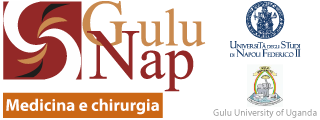Il progetto MAMA vuole prevenire queste morti con uno studio su 2.000 donne in gravidanza, somministrando vitamina D3 per ridurre complicanze come ipertensione, diabete e parto prematuro.
Il nostro obiettivo è fornire prove scientifiche alle istituzioni per migliorare l’assistenza materna.
Abbiamo bisogno del vostro supporto per trasformare questa ricerca in cura concreta. Aiutateci a salvare vite: ogni contributo può fare la differenza.
Contribuisci utilizzando l’IBAN:
IT60Q0306909606100000198390
intestato a: FEDERICO II FONDAZIONE Università degli Studi di Napoli Federico II
Download: Locandina del progetto MAMA Trial
Uganda has a high maternal mortality rate: for every 100,000 births, 197 women die from maternity (MPDRS 2025), 40 times more than in Italy. More than 80% of these deaths are preventable. The major causes of mortality are hypertensive disorders in pregnancy, such as pre-eclampsia and eclampsia, which account for 25% of deaths. MAMA (Maternal Aid for Mortality Awareness) aims to improve maternal care by focusing on the prevention of pregnancy complications through the administration of vitamin D. African women are at greater risk of Vitamin D deficiency due to their dark skin, which limits Vitamin D synthesis by sunlight.
Vitamin D is chosen as an intervention in the MAMA project because of its role in regulating the immune system, functioning of the placenta, and controlling blood pressure, thus reducing the risk of pre-eclampsia, preterm delivery, and low birth weight. MAMA chose Uganda because of the high rate of severe complications (such as hypertensive disorders of pregnancy, the second leading cause of maternal death to date) and the high rate of hypovitaminosis reported in this country (more than half of pregnant women are deficient in this important micronutrient).
Translated with DeepL.com (free version)The MAMA trial will recruit 2000 pregnant women, between 13 and 27 weeks of pregnancy, over 18 months, divided into: group A (daily doses of 2000 IU vitamin D, plus iron and folate, up to delivery for 1000 pregnant women), group B (iron and folate as a placebo for 1000 pregnant women). We will assess the occurrence of hypertensive disorders in pregnancy, maternal and foetal mortality, preterm delivery, low birth weight, and other maternal-fetal obstetric complications.
The context is the Gulu Region of Northern Uganda, where St.Mary’s Hospital in Lacor performs about 9000 deliveries per year, provides antenatal care to about 40-50 new pregnancies each week, and is committed to antenatal pregnancy protection activities. We propose efficient practice management through a robust and sustainable supply chain in the indicated context. Through state-of-the-art data collection methods, MAMA not only ensures scientific rigour, but also compliance with international ethical and regulatory standards, laying the foundation for responsible and replicable innovation. This trial will provide important data on the effect of Vitamin D supplementation in such a high-risk setting, in terms of improving the health of the mother and newborn. One aim is to produce strong scientific evidence of the appropriateness of the Vitamin intervention, which can be extended to the whole country and other African contexts.
We are looking for responsive partners who share our vision of a future in which maternal mortality in high-risk areas is reduced. Your support will be crucial in realising these ambitious goals. Each phase of the project is designed to respect and enhance local cultures, ensuring that each intervention is as effective as it is respectful. Joining MAMA means contributing directly to the health and well-being of thousands of women, with positive impacts on entire communities. Your support can be the catalyst that turns research into action, and hope into reality.
FIRST ESTABLISHMENT OF RESOURCES NEEDED FOR THE TRIAL
PHARMACIES: For 2000 pregnant women from the 2nd trimester of pregnancy to delivery, approximately 180-200 days, a daily dose of 200 mg Iron Sulphate (FeSO4) and 0.4 mg Folic Acid is needed. For 1000 pregnant women, 2000 units of Vitamin D should be added during the same period. For about 200 pregnant women at risk of pre-eclampsia, a daily dose of Calcium and Heparin should be provided for about 60 days.
- SURVEYS: It is necessary to ensure at least one early ultrasound examination for all pregnant women (2000).
- HUMAN RESOURCES: At least 4 full-time operators are needed for 2 years for the reception, anamnesis, data collection and follow-up of the women.
- LOGISTICS: It is necessary to provide transport, storage and management of materials
- AUTHORISATIONS: It is necessary to pay the various ministerial fees for authorisation
- DATA ANALYSIS: Managed with the collaboration of the University of Naples Federico II, GULUNAP Project.
Here you ask questions :
Margherita Arcidiaco: margherita@unina.it
LITERATURE:
Maternal mortality work with Luigi Greco and Cristina Reverzani
Estimating the Risk of Maternal Death at Admission: A Predictive Model from a 5-Year Case Reference Study in Northern Uganda
Cristina’s work on Vitamin D
Holick M.F. et al., (2011) Endocrine Society Clinical Practice
Reverzani et al_BMJ Open (2025)
Vitamin D (2015) during pregnancy why observational studies suggest deficiency
Selected work on Vitamin D trials
Vestergaard_RCT_DENMARK_BMC (2023) Pregnancy_Childbirth_ CELAN
Reverzani Clin Case Rep (2022) Septic shock, acute renal and liver
Awor Silvia_BMC (2023)_PET Lacor
Moghib_Vit D_Preeclampsia (2024) CLEAN
Fogacci S. et al., (2020) Syst RV_Vit D supplement and PET_CLEAN
Palacios C., Kostiuk L.K. et al (2019) Cochrane suppl Vit D pregnancy_CLEAN
WORLD HEALTH ORGANIZATION VitD (2020) supplementation_update


